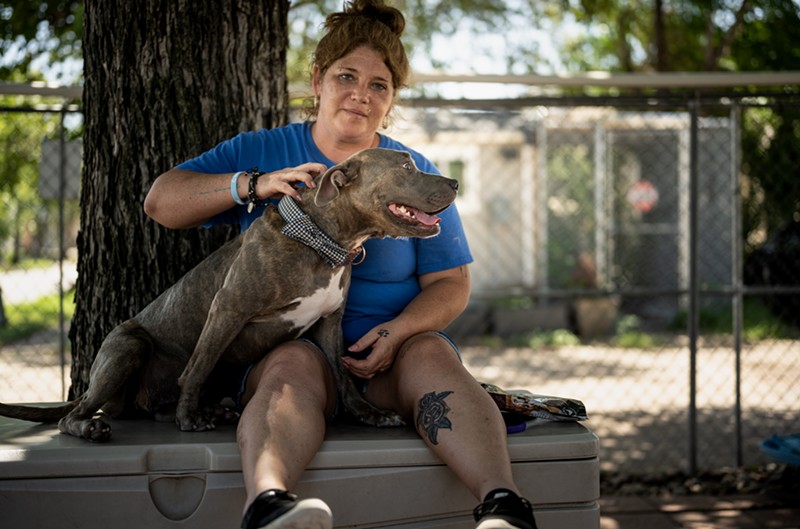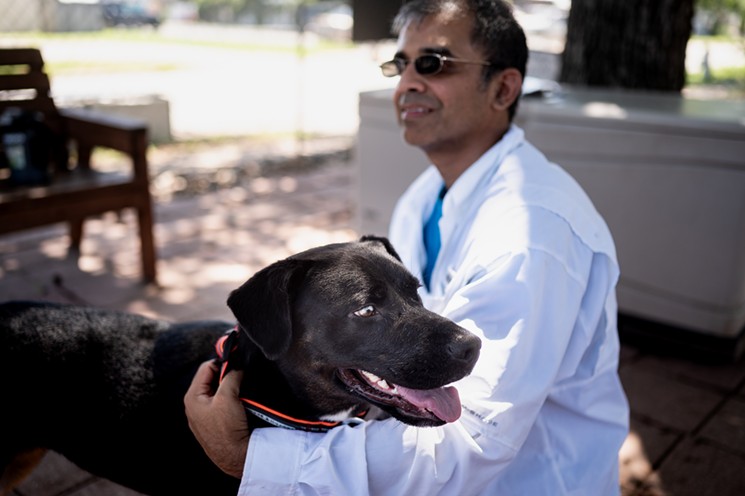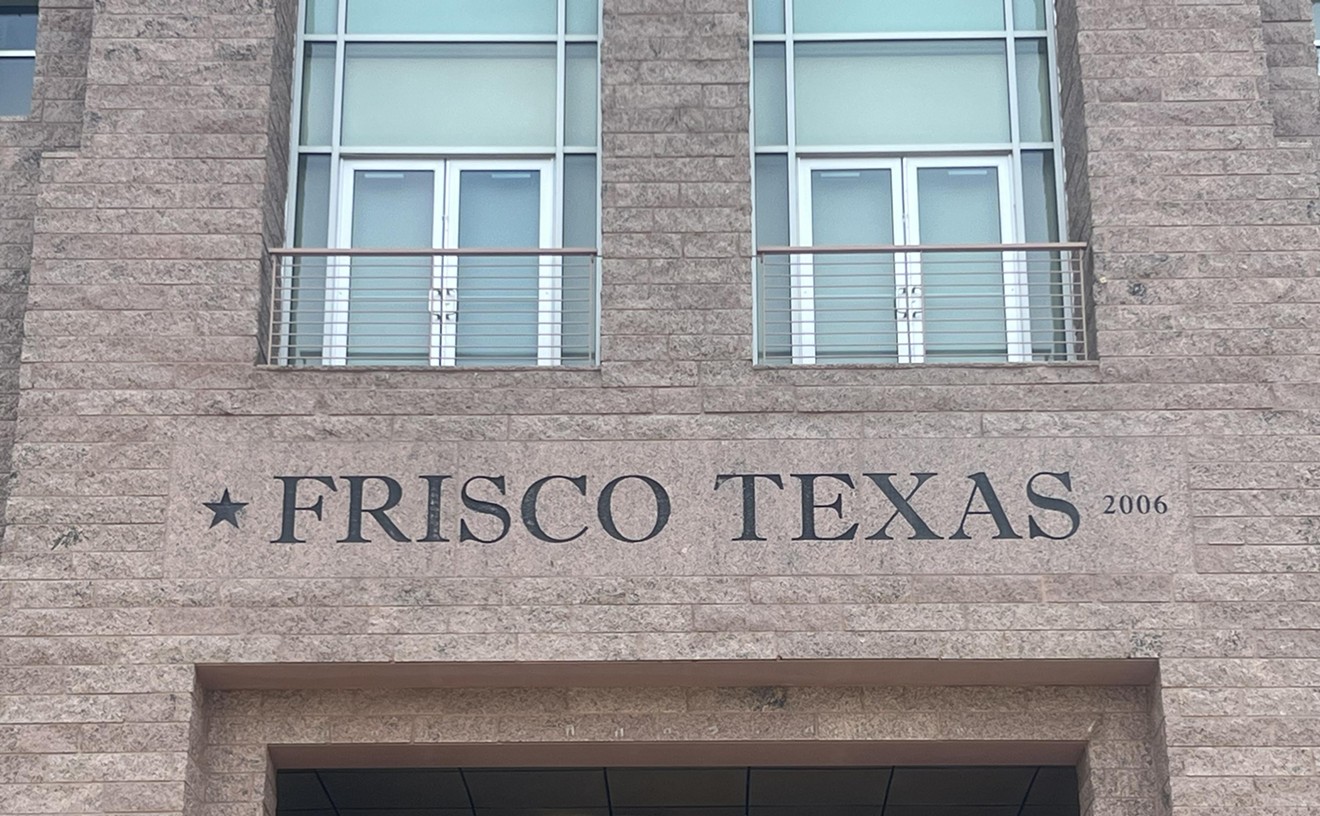Now imagine that Roscoe’s new family starts to change their mind. The pandemic appears to be winding down, and they’re at home less and less. One day, they load him into the car and drop him at the shelter once again.
Roscoe may be fictional, but for many pets across North Texas, his story rings all too true as animal shelters and rescues are reporting a disturbing new trend: post-pandemic “pet regret.”
Pet adoptions soared at the start of the pandemic with some shelters reporting they’d been cleared out. With Americans “sheltering in place” to avoid catching or spreading COVID-19, they turned to furry companions for emotional support. Around 23 million U.S. households — nearly one in five — got a pet during the crisis, according to the American Society for the Prevention of Cruelty to Animals. While many of those animals have found their forever homes, others haven’t been so lucky.
For a brief window of time earlier this year, many Texans had all but put COVID-19 in their rearview. Vaccinations were readily available to anyone who wanted them, and employees who’d worked remotely started trickling back into the office. Most were more than happy to return to normalcy. But for some, that also meant shedding their pandemic pet.
Around 45% of Texans who adopted or purchased a pet during the pandemic are experiencing pet regret, according to a poll by the pet products website Innovet Pet. The survey also found that more than 1 in 3 Americans who bought a pet now regret it.
When coronavirus cases were low at the beginning of the summer, Assistant Director Cynthia Luhring with the Humane Society of Dallas County (HSDC) began noticing a change. Suddenly, it seemed that stir-crazy Texans were itching to go on vacation, but they realized they had nowhere to house their animals, she said. Before long, the shelter saw a sharp rise in “surrenders” — the pilot term for “abandonment.”
“It’s outrageous. We can’t even take everyone in because we’re so full,” Luhring said. “More people are wanting to surrender now than I have ever seen in 11 years.”
From June 1 to Aug. 12 of this year, HSDC received 131 cats and 36 dogs, Luhring said. That’s up from 68 cats and 25 dogs over the same period in 2020.
As far as she’s concerned, far too many Texans used short-term thinking when making a long-term decision like adopting a new pet. It could be that they didn’t think about what would happen once the pandemic subsided, but that oversight ultimately falls back on the animal. For them, it’s stressful to be dumped at the shelter after they’d grown acclimated to living in a home for a year.
Luhring has heard the excuses. Some people say they’re going back to work and don’t have time to care for their pets anymore. Others blame it on moving. But after more than a decade in the business, Luhring isn’t so inclined to believe what everyone tells her.
North Texans need to spay and neuter their animals because “every shelter is overcrowded at this point,” she said. It’s disappointing to see so many pets abandoned by their owners. “All of them break our hearts to get returned, because we don’t want to see them back here,” Luhring said. Rather, she wants them to be in loving forever homes.
Some rescue operations in North Texas are reporting similar trends. Even though it’s getting fewer dogs overall this year, Golden Retriever Rescue of North Texas is receiving young pups “in numbers we haven’t seen,” said President John Hovland.
Lately, the young dogs coming in are “beautiful” and don’t have physical deformities or problems with aggression. For each of the last two months, approximately five golden retrievers have come their way — around two more than normal. While that may not seem like a lot, it adds up over time, he said."It’s not like having a little goldfish in a tank." - John Hovland, Golden Retriever Rescue of North Texas
tweet this
In the rescue business, Hovland often shakes his head at people who get rid of longtime family dogs. Some pets may be pushing 10, but their owner decides to give them up because they’re old and slow. Those are the cases where Hovland might say the owners are “terrible people,” but pandemic pet regret is a little different. Their owners could be returning to work, for instance, or they might be moving to an apartment because of COVID-related financial strain.
Hovland believes most pandemic adopters signed up for a dog because they were seeking comfort. Stuck at home, they wanted something to do, and “nice little fuzzy puppies are always good to have around,” he said. But inexperienced pet owners may have taken on more than they bargained for in terms of time and effort. When golden retrievers are around a year old, “all they've got is teeth,” he said. They also shed some and need to be trained, on top of requiring exercise and quality food.
“If you take care of [dogs] properly, you’re going to visit a vet, you’re going to spend a little money,” Hovland said. “It’s not like having a little goldfish in a tank.”
Hovland expects the surrender rates to continue spiking as the economy improves and more professionals return to the office. “I think it’s going to be a trend that’s going to be with us for a while,” he said. “But it’s really a function of what our world has gone through and our country has gone through over the past 18 months.”
Earlier this summer, reports began circulating that some North Texas animal shelters had reached capacity, including in Denton. There, Animal Services Manager Randi Weinberg has reported seeing a higher number of surrenders this year. While it’s not a significant amount, she said surrenders are around 6% higher than they were in 2019.
As with Luhring and Hovland, Weinberg believes one factor could be that people are returning to work. Some owners may be moving or have personal medical concerns and can no longer afford to care for their pet, she added.
Other trends have also emerged over the past year and a half. Since the pandemic began, Weinberg remembers seeing an uptick in adoptions, likely because folks were spending more time at home. At the same time, the shelter had expected more surrenders because of increased financial insecurity, but they actually saw a decline. In April 2020, Denton’s shelter helped to open a pet food pantry, which Weinberg theorizes may have worked to keep surrender numbers down for a while. The end of spring typically coincides with a spike in surrenders in a college town like Denton, since some students ditch their pets when they move back home.
Weinberg noticed another strange pattern across North Texas shelters last year: Kitties weren’t coming in. “That was a trend that everyone was like, ‘Where are the cats?’” she said, laughing. “I don’t know if they quarantined for the pandemic or what went on.”
But not all shelters have reported post-pandemic pet regret. In fact, with just 1% of pandemic pets being returned, Dallas Animal Services (DAS) is “seeing the opposite of that,” said Public Information Coordinator Leah Backo. And the overall adoption return rate has decreased this year compared with last.
Part of it could be because DAS is working to provide resources to pet owners in need, Backo said. The city has offered various support options such as a pet food pantry and call center to help advise those considering a surrender. They've also launched a partnership with a program called Home To Home, which lets North Texans find their pet the perfect new owner while circumventing the shelter.
One pet success story has stuck with Backo in particular. At the start of the pandemic, DAS had to adjust all of its shelter and field operations to make sure everyone was safe. With uncertainty shrouding the future, they asked the community for help in adoptions and fosters. That’s when Kambo, a tan and white pit bull mix who’d been with DAS for six weeks, got his lucky break: A foster mom named Liz Foster swooped in to let him stay at her home.
Kambo was well-behaved and had several funny quirks, such as lining up toys on the couch, Foster said. As a social media influencer with a large following, Foster began posting about how wonderful Kambo was, and within a matter of days, he was living in his forever home.
It’s great if people can adopt, Backo said, but she also encourages them to sign up to foster. Those opportunities are more short-term, but they still take the pet out of a stressful environment, letting them “figure out how to be a dog and how to be a cat.” Some people may even end up as “foster fails” and permanently adopt the animal instead of giving it away; that happened with Backo and her 6-year-old mutt Lace, who’s got white fur and is completely deaf.
In the same way that pets have kept their owners emotionally afloat throughout the pandemic, Backo said it’s important for the pet, too. Even if an animal gets sent to the “Taj Mahal” of shelters, it’s no match for being with a loving family. “No matter how nice of a shelter you’re going to,” she said, “it will never replace a home.”















